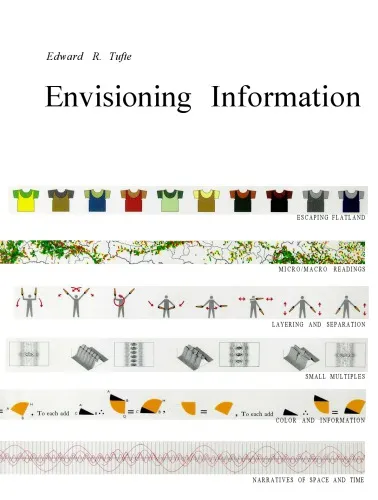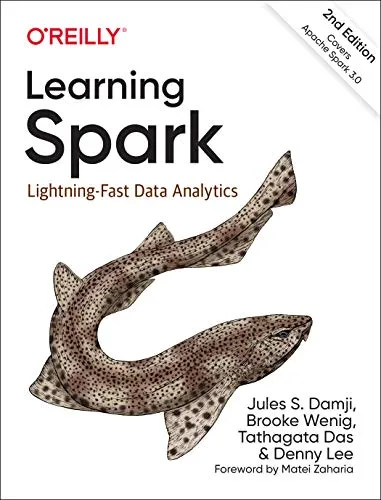Facts and Fallacies of Software Engineering
4.0
بر اساس نظر کاربران

شما میتونید سوالاتتون در باره کتاب رو از هوش مصنوعیش بعد از ورود بپرسید
هر دانلود یا پرسش از هوش مصنوعی 2 امتیاز لازم دارد، برای بدست آوردن امتیاز رایگان، به صفحه ی راهنمای امتیازات سر بزنید و یک سری کار ارزشمند انجام بدینکتاب های مرتبط:
معرفی کتاب "Facts and Fallacies of Software Engineering"
کتاب "Facts and Fallacies of Software Engineering" نوشته رابرت ال. گلس یکی از آثار مهم در حوزه مهندسی نرمافزار است که با زبانی شفاف و بیان مثالهایی دقیق به بررسی واقعیتها و پنداشتهای نادرست (Fallacies) در این رشته پیچیده میپردازد.
خلاصهای از کتاب
این کتاب از 55 واقعیت و 10 پنداشت نادرست درباره مهندسی نرمافزار تشکیل شده است. رابرت گلس بر اساس تجربیات دهها ساله خود در این صنعت، بینشهای ارزشمندی ارائه میدهد که تلاش میکند مرز میان دانش علمی و حقایق عملی در پروژههای نرمافزاری را نمایان کند.
یکی از جذابترین بخشهای این کتاب تفکیک "What We Believe" و "What is True" است. بسیاری از مفاهیمی که در ذهن متخصصان جا افتاده به شکل کلیشهای بیان شدهاند، اما گلس آنها را زیر ذرهبین برده و به تحلیل دقیق هر یک میپردازد.
نکات کلیدی (Key Takeaways)
- مدیریت پروژههای نرمافزاری بسیار دشوارتر از آن چیزی است که اغلب مردم فکر میکنند.
- پیشبینی هزینه و زمانبندی پروژهها همیشه با عدم قطعیت همراه است و نباید انتظار دقت بالا در آن داشت.
- ارتباط مؤثر و هماهنگی تیمی یکی از اصلیترین عوامل موفقیت در توسعه نرمافزار است.
- هیچ زبان برنامهنویسی یا ابزار خاصی بهتنهایی نمیتواند جایگزین تفکر و استراتژی صحیح در طراحی Software شود.
- نیازهای مشتریان به مرور زمان تغییر میکند و قابلیت تطبیق با این تغییرات برای پروژهها ضروری است.
جملات معروف کتاب
"The most important factor in software work is the quality of the people."
"Software engineering is always a balance between process and practice. Neither works well in isolation."
"Strong documentation can be a substitute for frequent communication."
چرا این کتاب مهم است
کتاب "Facts and Fallacies of Software Engineering" به دلیل نگاه واقعبینانه خود نسبت به مهندسی نرمافزار یکی از منابع آموزشی ارزشمند محسوب میشود. اهمیت این کتاب در نقد مدلهای رایج و رویکردهای کلاسیک است که اغلب به شکست پروژهها منجر میشوند. این کتاب نه تنها برای مهندسان نرمافزار بلکه برای مدیران پروژه، تحلیلگران سیستم و حتی دانشجویان نیز بسیار آموزشی و کاربردی است.
همچنین گلس در این کتاب تأکید میکند که فرآیندهای توسعه نرمافزار تنها زمانی موفق میشوند که بین "هنر مدیریت" و "علم مهندسی" تعادل برقرار شود. چنین بینشی میتواند دیدگاه تازهای در بسیاری از مسائل پیچیده این حوزه ارائه کند.
Introduction to "Facts and Fallacies of Software Engineering"
"Facts and Fallacies of Software Engineering" is a reflection of decades of my personal experience in the software industry, where I emphasize concrete truths and debunk common misunderstandings in software development. Writing this book was my way of presenting hard-earned lessons, rather than theories, about what truly works and what doesn’t in software engineering. The aim is to challenge assumptions, encourage critical thinking, and deliver principles that enable practitioners to approach software development more effectively and practically.
The field of software engineering is abundant with myths, conflicting advice, and fleeting trends, but it desperately needs timeless truths. This book is not a technical manual—rather, it is a guide meant for developers, managers, and all stakeholders in the software process. It discusses some of the core facts and inevitable fallacies software engineers must face, ranging from productivity and team dynamics to estimation techniques and quality assurance. With topics drawn from real-world experience, the book serves as a mirror to the challenges and contradictions that define our field.
Structured into sections that clarify invaluable facts while addressing persistent fallacies, "Facts and Fallacies of Software Engineering" delivers insights that are as relevant today as they were when I first wrote them. The timeless applicability of these lessons ensures the book remains a cornerstone for anyone serious about understanding and improving software development practices.
Detailed Summary of the Book
The book is divided into two key parts—Facts and Fallacies. Each fact represents a core principle of software engineering, and each fallacy challenges a widely held but flawed belief.
In the Facts section, I share truths that software engineers must internalize to succeed. These facts uncover realities about topics such as project complexity, productivity, and the importance of good communication. For instance, I highlight that most software development projects will take longer than expected, not due to developer incompetence but because of inherent uncertainties in the field.
The Fallacies section debunks dangerous misconceptions. For example, I argue that adding manpower to a late project (often referred to as Brooks' Law) is rarely effective. Other fallacies address overreliance on metrics, the myth of "quick fixes," and the mistaken belief that hiring more programmers will automatically result in faster delivery.
Throughout the chapters, the book is interspersed with anecdotes, studies, and humor to help break down complex problems and make the lessons more relatable. It urges readers to learn from past mistakes and adopt a balanced perspective toward both technical and human factors involved in software engineering.
Key Takeaways
- Software projects are inherently complex; estimating them accurately is extremely difficult.
- Good communication and people management are just as critical as technical expertise for success.
- Adding more resources to a failing project often exacerbates problems rather than resolving them.
- Quality should never be an afterthought; it needs to be baked into every step of the software process.
- Software engineering is not a strict science—it blends logic with creativity and practicality.
Famous Quotes from the Book
"The only certainty about a software project's schedule is that it will not go quite as planned."
"Progress is made by making things simpler, not by making them more complex."
"Adding people to a late project makes it later."
"Metrics are often misused, leading to the wrong conclusions and sometimes disastrous consequences."
Why This Book Matters
Software engineering continues to challenge developers, managers, and organizations to this day. This book matters because it provides insights derived from decades of industry experience, focused on timeless truths rather than trendy fads. By addressing both the facts and fallacies, it equips readers not just with knowledge but the wisdom to discern right from wrong.
Developers often find themselves overwhelmed by new technologies, methodologies, and tools, but the principles in this book serve as a compass to guide them through the noise. It emphasizes that software engineering is a human endeavor as much as a technical one and advises readers to approach project management, estimation, and teamwork sensibly.
This book fills the gap between academic theory and practical application. It empowers its readers to make informed decisions, avoid common pitfalls, and continuously improve their craft. By learning from the lessons within, anyone involved in software development—from seasoned architects to fresh graduates—will gain a deeper appreciation for the discipline and become more effective practitioners.
دانلود رایگان مستقیم
شما میتونید سوالاتتون در باره کتاب رو از هوش مصنوعیش بعد از ورود بپرسید
دسترسی به کتابها از طریق پلتفرمهای قانونی و کتابخانههای عمومی نه تنها از حقوق نویسندگان و ناشران حمایت میکند، بلکه به پایداری فرهنگ کتابخوانی نیز کمک میرساند. پیش از دانلود، لحظهای به بررسی این گزینهها فکر کنید.
این کتاب رو در پلتفرم های دیگه ببینید
WorldCat به شما کمک میکنه تا کتاب ها رو در کتابخانه های سراسر دنیا پیدا کنید
امتیازها، نظرات تخصصی و صحبت ها درباره کتاب را در Goodreads ببینید
کتابهای کمیاب یا دست دوم را در AbeBooks پیدا کنید و بخرید
1635
بازدید4.0
امتیاز0
نظر98%
رضایتنظرات:
4.0
بر اساس 0 نظر کاربران
Questions & Answers
Ask questions about this book or help others by answering
No questions yet. Be the first to ask!














